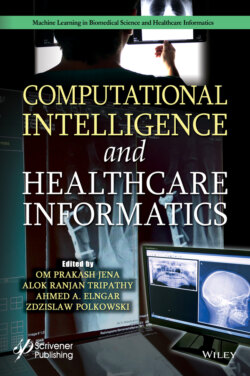Читать книгу Computational Intelligence and Healthcare Informatics - Группа авторов - Страница 14
1.1 Introduction
ОглавлениеMachine Learning (ML) is a computer program that learns from experience with respect to a particular task assigned and gives result accordingly. The performance of such computational algorithm improves with experience. Health is a major area of concern for everyone and to provide the best healthcare service is becoming one of the major goals of almost every country. But doing that is not an easy task as collecting the medical data and providing it to leverage knowledge so that the best possible treatment can be provided is itself very challenging. So, data plays a crucial part in extracting information and addressing problems related to health. ML has the ability to extract information from the data being provided and further helps in resolving this fundamental issue to some extent.
The huge medical data need to be interpreted and processed by epidemiologists. The input of healthcare providers has been expanded and also created new opportunities due to the availability of huge amount of data related to patients and facility being provided which will further help in achieving the necessary approaches related to prevention and treatment [1]. Due to the complexity of medical data and also lack of technology, the collection was completely ignored in the past. ML algorithm has proved to overcome such difficulties by collecting the medical data securely and further applying it for diagnosis and prognosis. ML has improved several domains like Automatic Speech Recognition (ASR), Natural Language Processing (NLP), and computer vision by using the data. Creating the correct model for maintaining the electronic medical records (EMRs) is a challenging issue due to its availability, quality, and heterogeneity.
Big data is going to play a major role in revolutionizing the healthcare services in the coming future by using algorithm to detect and treat diseases [2]. Its impact on the practice of medicine is fundamentally going to transform the physician ability to personalize care directly to the people. The way to achieve this goal is by collecting data through handheld and wearable devices. This data will be compared with the genetic profile of people and further used for decision-making. The vast medical data needs to be integrated and accessed intelligently to support better healthcare delivery. Big data can create new networks of sharing knowledge by measuring and monitoring processes digitally [3]. Data comparison will be easier which will facilitate streamlined workflows greater efficiencies and improved patient care. Systematic analysis of extensive data can help to detect patterns so that clinicians can provide treatment to individuals and project health outcomes. Digital networks can bring together partners and knowledge sharing delivering context relevant clinical information enables more holistic decision-making. Healthcare can only benefit from big data when it is made structured relevant smart and accessible.
Figure 1.1 shows the how ML and big data analytics plays an important role in different fields associated with healthcare services. There are five major modules associated with ML algorithm and their contribution. The physician unstructured data is provided to ML algorithm and, in return, gets better clinical decision support. Also, the radiologist provides data in form of MRI/images and receives diagnostics from ML. It provides the patient a better lifestyle advice and treatment option. Patients are complex module with different genetic back ground so the risks associated with them are different over time. The drug makers get patients medical records for development of necessary drugs. The clinical research and development module provides bio illustration to the algorithm and gets predictive analysis.
